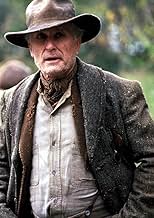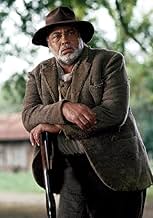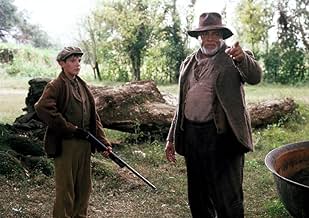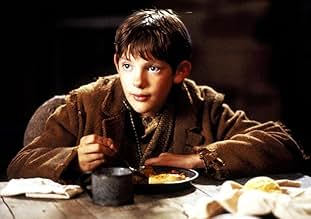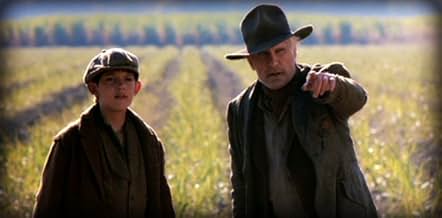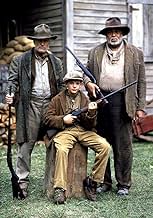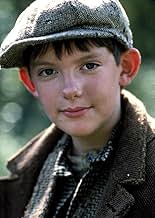Horton Foote's story of a teen-aged boy in the Depression who finds work on an eccentric's sugar plantation and learns life's surprising lessons from the team of convicts who also work there... Read allHorton Foote's story of a teen-aged boy in the Depression who finds work on an eccentric's sugar plantation and learns life's surprising lessons from the team of convicts who also work there.Horton Foote's story of a teen-aged boy in the Depression who finds work on an eccentric's sugar plantation and learns life's surprising lessons from the team of convicts who also work there.
Bob Edmundson
- Overseer
- (as Robert Edmundson)
Featured reviews
I don't know what to make of this film. It is certainly original and well-crafted. Duvall is outstanding as usual, as well as the supporting cast. Overall, the acting is superb, even young Horace, who is a bit stilted in his role, but that is the way the story is written. The plot never goes anywhere, and that is what is disappointing - the unidimensional nature of the story. More of a character study than a story. All in all, I may feel more strongly about the film in time, because it is the sort of cinema that stays with you, and that is the mark of a good film, anyway. Definitely unique and different and if you enjoy quirky movie, you may like this one.
Robert Duvall gives a creditable performance as the supervisor of a convict farm in 1902 Texas who befriends a young boy (Lukas Haas). The screenplay, written by Horton Foote, contrasts the difficulties of growing up and growing old. Duvall's character is senile and suffering ill health. He alienates himself from family and associates - except for a former convict assigned to his charge, the young boy who reminds him of his youth, and a couple who live in the village store.
It's a nice set piece, and the warm colors create a real feeling of turn-of-the-century South. While Duvall's character could have been fleshed out more, he does an excellent job as a man intent on dying on his own terms with help from his young charge
It's a nice set piece, and the warm colors create a real feeling of turn-of-the-century South. While Duvall's character could have been fleshed out more, he does an excellent job as a man intent on dying on his own terms with help from his young charge
Not a finely crafted film by any measure as the editing and directing were intrusive and clumsy, but Robert Duvall gives one of his totally unique and unforgettable performances as an old and very crusty Southern farmer riddled with dementia and poor health. His one day mental decline into death is one of the most fascinating performances I have ever seen in film. If you really love superior acting talent and skill don't miss it, as it is a rare master class to be sure.
Also see it for the well shown and very authentic love/hate, paternal interrelationship between Southern whites and blacks in the Jim Crow era. And, if you like Duvall in this one, see him in another nearly unknown film role just as good or better and one of my all time faves.... a retired Cuban gentilehombre in Wrestling Ernest Hemingway.
Treat yourself. Bigtime.
Also see it for the well shown and very authentic love/hate, paternal interrelationship between Southern whites and blacks in the Jim Crow era. And, if you like Duvall in this one, see him in another nearly unknown film role just as good or better and one of my all time faves.... a retired Cuban gentilehombre in Wrestling Ernest Hemingway.
Treat yourself. Bigtime.
Like many stage adaptations, this film is a collection of set pieces without a tight overarching narrative. Not only is it adapted from the stage, but from the middle of a three-act play, which serves to remove some of the context; the viewer is just plopped into the middle of this one.
I thought the performances were good overall, but the production was somewhat lacking. Perhaps the streaming version I saw was a bad transfer, but the cinematography was nothing to write home about, the contrast was way too high in many of the daylight scenes, and the colors looked as if the film was shot on old, faded film stock.
A bit of a strange soundtrack too, but I liked it and I thought it was fitting.
I would recommend it if you like Foote, Faulkner, or Duvall.
I thought the performances were good overall, but the production was somewhat lacking. Perhaps the streaming version I saw was a bad transfer, but the cinematography was nothing to write home about, the contrast was way too high in many of the daylight scenes, and the colors looked as if the film was shot on old, faded film stock.
A bit of a strange soundtrack too, but I liked it and I thought it was fitting.
I would recommend it if you like Foote, Faulkner, or Duvall.
If you care for fine acting and excellent characterization, try this film. It doesn't take the commercial, slick, easy approach to the storyline about the reason for use of convict labor on Southern plantations, or about the treatment of the convicts unlucky enough to be doing time at hard labor. Filled with well-thought-out glimpses of the declining southern gentry, the economics of plantation ownership, racism, and other tough subjects, it is also a commentary on human fragility.
Did you know
- GoofsWhen Soll thinks he hears someone in the closet he shoots three times and we see three bullet holes. But when Jackson opens the closet door to investigate, there are four holes.
- Quotes
Horace Robedaux: Martha, are you afraid of dying?
Martha Johnson: No, I ain't afraid. Just not ready to go yet.
- SoundtracksGolden Slippers
Sung by Jackson
- How long is Convicts?Powered by Alexa
Details
- Release date
- Country of origin
- Language
- Also known as
- Horton Foote's Convicts
- Filming locations
- Production company
- See more company credits at IMDbPro
Box office
- Gross US & Canada
- $13,623
- Opening weekend US & Canada
- $6,347
- Dec 8, 1991
- Gross worldwide
- $13,623
Contribute to this page
Suggest an edit or add missing content

